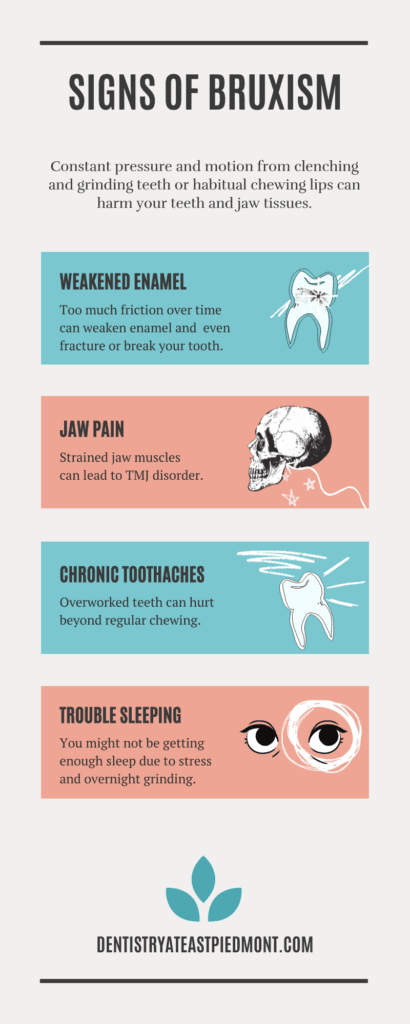 Teeth grinding, or bruxism, refers to the continuous clenching, grinding, or gnashing of teeth. There are two kinds of bruxism: daytime bruxism and sleep bruxism. Sleep bruxism can be particularly dangerous as many sufferers may not even be aware of its occurrence.
Teeth grinding, or bruxism, refers to the continuous clenching, grinding, or gnashing of teeth. There are two kinds of bruxism: daytime bruxism and sleep bruxism. Sleep bruxism can be particularly dangerous as many sufferers may not even be aware of its occurrence.
If you’re unsure of whether or not you grind your teeth, be on the lookout for signs of recessed or inflamed gums, tooth sensitivity, and chronic pain in the ear, mouth, and/or jaw area.
 Side Effects
Side Effects
Your cheek muscles are one of the most active muscles in your body, so even occasional bruxism can damage your health. Left untreated, bruxism can result in:
– Tooth pain
– Fractured teeth
– Tooth loss
– Worn enamel
– Jaw ache
– TMJ development
Causes
There are multiple contributing factors to teeth grinding. Bruxism may be caused by one or more of the following:
Hyperactivity
Those who suffer from disorders such as anxiety and ADHD often develop physical habits to let out nervous energy, whether coping tactics or not. Even tension or high stress levels can cause your body to find outlets for all that excess energy.
Sleep Disorders
Disorders such as sleep apnea, insomnia, snoring, sleep talking and sleep paralysis may result in clenching or grinding of teeth as you rest.
Malocclusion
Commonly referred to as teeth misalignment, malocclusion is a known secondary or tertiary condition that leads to grinding. Coupled with a sleep disorder or hyperactivity, upper jaw problems such as an abnormal bite or misaligned smile may result in persistent pressure.
Solutions
While there’s no way to stop bruxism entirely, there are measures you can take to lessen the symptoms or frequency of the condition:
1. Avoid Stimulants
Substances like caffeine and nicotine will increase hyperactivity, making your body crave a way to release this energy.
2. Reduce Stress
Find healthy alternatives to expel nervous energy like exercise and meditation. If possible, avoid situations that may cause undue stress.
3. Quit Unnecessary Chewing
Avoid bad teething habits such as nail biting or chewing on ice. Even limiting how much gum you chew helps decrease the overall impact on your teeth.
Diagnosis & Treatment
Orthotic appliances like a mouthguard or splint are one of the best ways to treat bruxism. A mouthguard will act as a barrier between your teeth so that you won’t wear away enamel when you grind.
Over-the-counter mouthguards are easily available but are made of very soft materials, rendering them useless once they quickly wear away. It’s best to invest in a custom-fitted mouthguard made of harder material like acrylic for a safer, longer-lasting solution. Custom mouthguards will also provide a much higher level of comfort.
If you suspect you may suffer from bruxism, the best thing to do is talk to your dentist. Your dentist will be able to determine not only whether or not you’re experiencing bruxism, but they’ll also be able to evaluate the overall cause of grinding to recommend the best solutions.


